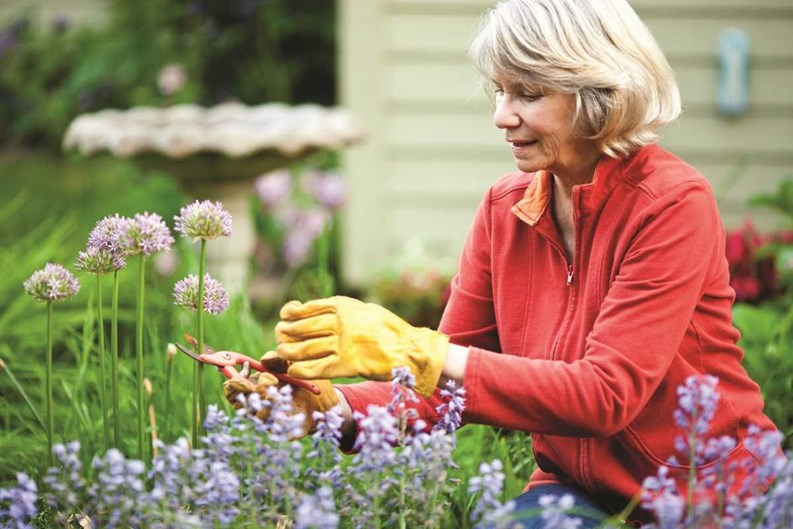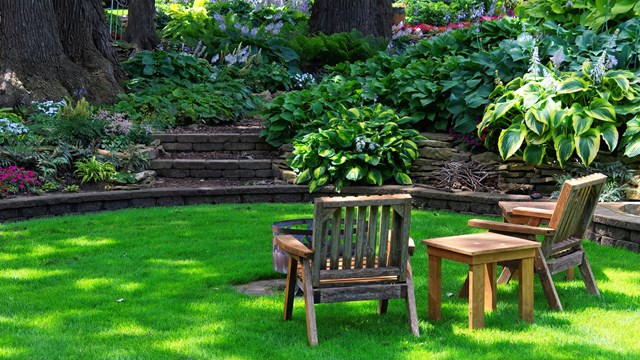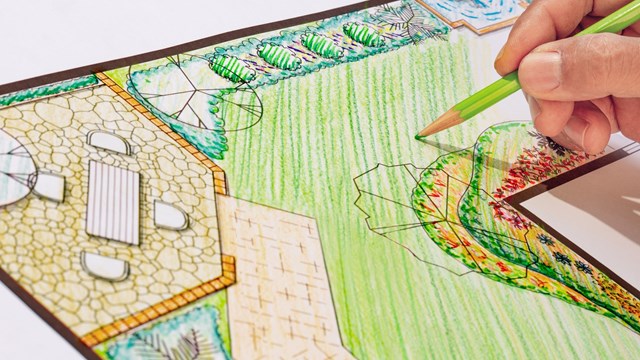No matter the size of community, one of the goals any condo or HOA has for their landscaping plan is to increase owner enjoyment of the property and enhance their investment purchase.
Larger complexes often have a landscaper in house, or under contract, to care for the lawns, flowers, greenery and other plantings around the property. Smaller associations may have a lawn or landscaping service cut the grass weekly—but due to the size and budget—a personal touch from one (or more) green-thumbed residents can undoubtedly enhance the community’s curb appeal.
Getting Started
Many condo associations encourage residents to get more involved in the planning, designing, planting, and caring for exterior flora, whether it’s sprucing up flowerbeds, courtyards, and entrances, or researching the costs for suitable shrubs and other horticultural specimens for upgrading their property. These activities are commonly handled by gardening or landscaping committees.
“In most cases, responsibilities of a landscape committee consist of several things,” says Kris Sokol, landscape operations manager of A Safe Haven Landscaping, based in Chicago. “Their main responsibility is to assist the board in developing standards of maintenance of existing common area landscaping, to assist the board in developing an improvement plan for the common area landscaping, and assisting the board in monitoring the performance of the contractors hired for maintenance, and improvement of the landscaping.”
There are a variety of ways to start a garden or landscaping committee. Sometimes, the genesis is from a resident who just enjoys gardening, or it may be a handful of residents who decide to form a committee to examine ways to improve and replace decades-old and overgrown landscaping that is encroaching upon the buildings and its entrances.
“If residents are interested in forming a landscape committee they should outline the duties and share the relevant financial information. They should also be clear about any timing expectations, for example, if a project is to be extended over a multi-year period or if it needs to be completed by a certain date when proposals are to be presented to the board for a vote,” says Christine E. Evans, CMCA, PCAM of Associa and the past president of Vanguard Community Management in Schaumburg, an Associa Chicagoland company. “There are so many benefits of having a landscape committee, but the biggest one is that it fosters volunteerism.”
“You receive more input from homeowners,” adds Elena Lugo, director of marketing & operations of FirstService Residential Illinois’ Chicago office. “There are more eyes on the community and, ultimately, the board saves time.”
Avoiding Conflict
For the condo board and manager, avoiding conflict between the landscaping committee and the landscape contractor is indeed a delicate dance, especially if the committee takes a heavy-handed approach toward the property’s landscaping activities.
“Landscape committees often want to do much more than the budget allows,” says Evans. “Another drawback is that the board doesn’t support major changes that they want to make, both of which can be resolved by creating a committee charter that clearly outlines the parameters for the committee and set straightforward budgetary restraints.”
Experts say that landscaping is very subjective and there can be many different opinions, even among the landscaping community. Oftentimes, the landscape committee will steer things more towards their preferences rather than for the greater good of the community. That can become a challenge.
The owner of the landscape or gardening company, ideally, will have good technical skills and knowledge of plant material, fertilization, and weed control. He or she may even have specific state licenses. According to experts, it is best to avoid a discussion or confrontation between the committee member and the contractor/businessowner regarding which month is best to prune roses; where, how and when to apply weed control; and how much mulch is required to be beneficial. The landscapers are the professionals, and even though volunteers on the landscape or garden committee may have green thumbs, they are not the professionals.
As a property manager, one of Evans’ goals is to bring the committee and the landscaper together to make these decisions. Evans maintains that the board should determine guidelines for the landscaping committee to keep things under control, as well.
“When there’s an extremely active and capable committee, often they want to do much of the directing,” says Evans. “While we aim to have our managers considered as a consultative resource, we also don’t want to discourage volunteers by insisting that the manager handle the oversight. A good balance can be created where there is a good working relationship established that takes into consideration all the details of each project.”
“Before the committee contacts a professional landscaper for help, they should start with knowing what the board thinks it needs the most help with, or what the board recognizes as issues that need addressing when it comes to landscaping,” says Sokol. “In most cases, committees come about because the existing landscaping is not properly maintained and the board needs help with the development of the maintenance standards and the oversight of the landscape maintenance contractor.”
The duties of a condo gardening or landscaping committee can vary greatly. Some groups are very hands-on, with members getting their hands dirty planting, weeding, and maintaining. Others are more conceptual, concerned with the design and aesthetic look of the landscaping and opt out of donning their gardening gloves, offering well-researched suggestions on what areas may need attention at their properties. These could be overgrown wooded areas, patches of bare lawn, or prominent spaces lacking colorful blooms.
“Usually, a committee chairperson will contact our office and ask to meet with a landscape professional on site to discuss issues that exist at the complex,” says Sokol. “It could be a whole gamut of problems, or just single individual problems they are addressing. In the past, we have helped committees with developing standards of maintenance, short and long term landscape improvement plans, and installation and maintenance of green roofs. In addition, we have priced out projects for the committees and performed that work after board approval.”
Surveying the Scene
Experts recommend various landscaping committee members walk their properties to examine the grounds, identify and determine what plantings might need to be replaced, removed, pruned, and maintained, and to take that walk again with the landscaper. Committee members should not get caught up in the emotional aspects of landscaping; instead, view the project from the community’s standpoint.
In best practice, the landscape committee will meet with the property management and their board prior to the season and they will decide what their expectations are, what are the budgets and what are the priorities. If the committee doesn’t have any exact specifications their landscaper can help them. The next step is to meet with the landscaper, and set up a spring walk and inspect the whole property. A committee needs to establish a sense of credibility to be taken seriously in a community. For condo associations looking to establish gardening or landscaping committee, there are numerous resources to help with the process.
“Landscape companies themselves often have great resources to offer that include professional advice regarding benefits and pitfalls of particular plant materials, real time/life examples of work they’ve done of a similar nature to what is being considered along with the advice of arborists,” says Evans. “In some areas there are city, county, and state organizations that offer localized information as well.”
According to the professionals, having a game plan is critical. One idea is for committee members to meet with the property manager and landscaper before the planting and pruning season begins to discuss the actual specifics of the landscape contract. And as always, communication is key.
Experts recommend taking a long-term approach to landscaping, preferably looking at it on a five-year not yearly basis. The ability of the landscaping committee to work with the community is crucial because in most communities there are restrictions on what residents can do with the landscaping around their unit. In those instances. the landscaping committee must help the community to understand the approval process to ensure consistency and an overall landscape design.
Landscaping not only helps a condo or HOA increase property value, it has a positive impact on the entire community as well. After all, stunning green spaces and plantings increase pride of ownership, influence morale, and makes a residential area more attractive.
Cynthia Allegrezza is a freelance writer. Staff writer Christy Smith-Sloman of The Chicagoland Cooperator contributed to this article.







Comments
Leave a Comment